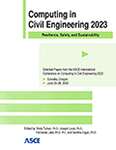Investigating the Data Inputs and Requirements for Response and Recovery Decision Models in Flooding Events
Publication: Computing in Civil Engineering 2023
ABSTRACT
Access to accurate and timely data by disaster response decision-makers is vital in the management of flood risk. The possibilities of using emerging and historical data have increased the need to develop systematic methods for evaluating data input requirements to ensure appropriate use of data-driven methods in disaster response. The goal of this work is to present current data formats and requirements in response and recovery decision models and identify potentials to include measures of equity to make them more flexible and equitable for a larger segment of the US population. This study evaluates existing decision models and presents a framework to aid researchers and modelers to incorporate social vulnerability and community data with other data sources used in disaster response and recovery. The framework contributes to the advancement of flood resilience management by providing an analysis process to facilitate inclusion of diverse data streams for use in decision-making.
Get full access to this article
View all available purchase options and get full access to this chapter.
REFERENCES
Ahmadalipour, A., and H. Moradkhani. 2019. “A data-driven analysis of flash flood hazard, fatalities, and damages over the CONUS during 1996–2017.” Journal of Hydrology, 578: 124106.
Alabbad, Y., E. Yildirim, and I. Demir. 2022. “Flood mitigation data analytics and decision support framework: Iowa Middle Cedar Watershed case study.” Science of The Total Environment, 814: 152768.
Beniston, M., and M. Stoffel. 2016. “Rain-on-snow events, floods and climate change in the Alps: Events may increase with warming up to 4°C and decrease thereafter.” Science of The Total Environment, 571: 228–236.
Bennett, B., M. Leonard, Y. Deng, and S. Westra. 2018. “An empirical investigation into the effect of antecedent precipitation on flood volume.” Journal of Hydrology, 567: 435–445.
Chakraborty, L., J. Thistlethwaite, A. Minano, D. Henstra, and D. Scott. 2021. “Leveraging hazard, exposure, and social vulnerability data to assess flood risk to indigenous communities in Canada.” Int J Disaster Risk Sci, 12 (6): 821–838.
CIO Council. CIO 2019. Project Open Data: Open Data Policy – Managing information as an asset. Viewed March 2023.
Ellingwood, B., J. W. van de Lindt, and T. P. McAllister. 2019. A fully integrated model of interdependent physical and social infrastructure systems. NIST. Bruce Ellingwood, John W. van de Lindt, Therese P. McAllister.
French, S., and C. Niculae. 2005. “Believe in the model: Mishandle the emergency.” Journal of Homeland Security and Emergency Management, 2 (1). De Gruyter.
Fuchs, S., and T. Thaler, eds. 2018. Vulnerability and Resilience to Natural Hazards. Cambridge University Press.
Hristidis, V., S.-C. Chen, T. Li, S. Luis, and Y. Deng. 2010. “Survey of data management and analysis in disaster situations.” Journal of Systems and Software, 83 (10): 1701–1714.
Janssen, M., J. Lee, N. Bharosa, and A. Cresswell. 2010. “Advances in multi-agency disaster management: Key elements in disaster research.” Information Systems Frontiers, 12 (1): 1–7. Springer.
Kreibich, H., P. Bubeck, M. Van Vliet, and H. De Moel. 2015. “A review of damage-reducing measures to manage fluvial flood risks in a changing climate.” Mitig Adapt Strateg Glob Change, 20 (6): 967–989.
Kundzewicz, Z. 2013. Emerging Lessons from Ecosystems | Floods: Lessons about Early Warning Systems Late Lessons from Early Warnings: Science, Precaution, Innovation 347 Emerging Lessons from Ecosystems | Floods: Lessons about Early Warning Systems.
Naumann, F., and L. Raschid. 2006. Information integration and disaster data management (DisDM).
McAllister, T., C. Clavin, B. Ellingwood, J. van de Lindt, D. Mizzen, and F. Lavelle. 2019. Data, information, and tools needed for community resilience planning and decision-making. NIST SP 1240. Gaithersburg, MD: National Institute of Standards and Technology.
OASIS (Open Advanced System for dISaster end emergency management). Decision support activities research report,.
Peng, Y., Y. Zhang, Y. Tang, and S. Li. 2011. “An incident information management framework based on data integration, data mining, and multi-criteria decision making.” Decision Support Systems, 51 (2): 316–327.
Pignatelli, C., P. Sansò, and G. Mastronuzzi. 2009. “Evaluation of tsunami flooding using geomorphologic evidence.” Marine Geology, 260 (1): 6–18.
Romanowski, C. J., S. Mishra, R. K. Raj, T. Howles, and J. Schneider. 2013. “Information management and decision support in critical infrastructure emergencies at the local level.” 2013 IEEE International Conference on Technologies for Homeland Security, 113–118.
Saleem, K., S. Luis, Y. Deng, S.-C. Chen, V. Hristidis, and T. Li. 2008. “Towards a business continuity information network for rapid disaster recovery.” Proceedings of the 2008 international conference on Digital government research, dg.o ’08, 107–116. Montreal, Canada: Digital Government Society of North America.
Schneider, J., C. Romanowski, and K. Stein. 2013. Decision making to support local emergency preparation, response, and recovery. 498–503.
Silva, T., V. Wuwongse, and H. N. Sharma. 2011. “Linked data in disaster mitigation and preparedness.” 2011 Third International Conference on Intelligent Networking and Collaborative Systems, 746–751.
Tsai, M.-H., E.-X. Sung, and S.-C. Kang. 2016. “Data-driven flood analysis and decision support.” Natural Hazards and Earth System Sciences Discussions, 1–14. Copernicus GmbH.
Wachowicz, M., and G. J. Hunter. 2005. “Dealing with uncertainty in the real-time knowledge discovery process.” Geo-information for Disaster Management, P. van Oosterom, S. Zlatanova, and E. M. Fendel, eds., 789–797. Berlin, Heidelberg: Springer.
Ye, F., et al. 2020. “Simulating storm surge and compound flooding events with a creek-to-ocean model: Importance of baroclinic effects.” Ocean Modelling, 145: 101526.
Information & Authors
Information
Published In
History
Published online: Jan 25, 2024
ASCE Technical Topics:
- Business management
- Decision making
- Disaster preparedness
- Disaster recovery
- Disaster response
- Disaster risk management
- Engineering fundamentals
- Floods
- Hydrologic data
- Hydrologic engineering
- Hydrology
- Information management
- Model accuracy
- Models (by type)
- Practice and Profession
- Risk management
- Water and water resources
Authors
Metrics & Citations
Metrics
Citations
Download citation
If you have the appropriate software installed, you can download article citation data to the citation manager of your choice. Simply select your manager software from the list below and click Download.
